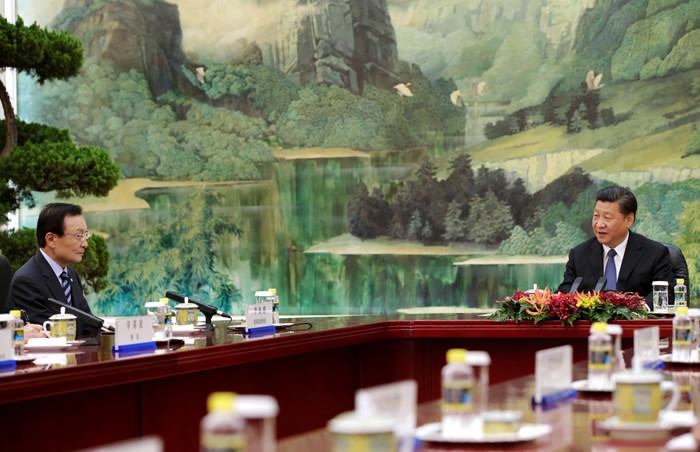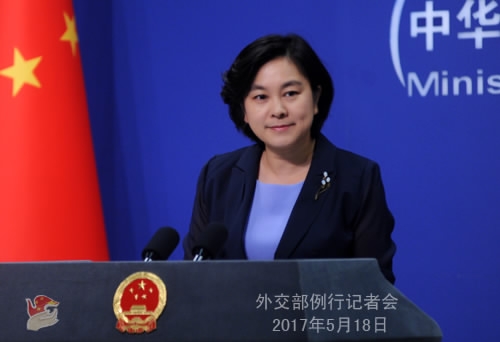China values its relations with the Republic of Korea (ROK) and is willing to work with Seoul to bring bilateral ties back to the normal track, Chinese President Xi Jinping told ROK President Moon Jae-in's Special Envoy Lee Hae-chan in Beijing on Friday.
As neighbors, China and the ROK have made immense progress in bilateral relations since the establishment of diplomatic ties 25 years ago, Xi said, adding that the two countries have made significant contributions to safeguarding peace and stability in the region.
"China-ROK relations are at a crucial stage at the moment," the Chinese president stressed. "China attaches great importance to its relations with the ROK, and would like to work with the ROK side to safeguard the hard-won achievements made in the development of bilateral ties."

Chinese President Xi Jinping (R) meets with ROK President Moon Jae-in's Special Envoy Lee Hae-chan at the Great Hall of the People in Beijing on May 19, 2017. /Reuters Photo
The two sides should consolidate the mutual political trust and properly handle divergence on the basis of mutual understanding and mutual respect so as to bring China-ROK relations back to the normal track at an early date, Xi added.
He emphasized that China remained committed to denuclearizing the Korean Peninsula, maintaining peace and stability there and resolving problems through dialogue and negotiation, which was in line with the common interests of China, the ROK and the whole region.
China is willing to enhance communication with the new administration of the ROK to defuse tensions on the peninsula and promote its denuclearization, Xi said, underscoring the goal of restarting dialogue and communication at an early date.

Chinese President Xi Jinping (R) shakes hands with ROK President Moon Jae-in's Special Envoy Lee Hae-chan at the Great Hall of the People in Beijing on May 19, 2017. /Xinhua Photo
Lee, ROK's former prime minister from 2004 to 2006 under late President Roh Moo-hyun, presented Xi a handwritten letter by Moon.
He said relations between the two countries had a great potential and a broad prospect. The ROK fully understands China's major concerns and is ready to strengthen communication and coordination with the Chinese side to remove any obstacles to the development of bilateral ties, he stressed.
Lee added the ROK and China shared similar views and positions on the nuclear issue of the Korean Peninsula and that his country was willing to work with China to realize the denuclearization of the peninsula and safeguard peace, stability and security in Northeast Asia.
Chinese State Councilor Yang Jiechi, who also met with Lee on Friday, urged the ROK to respect China's major concerns and properly handle the issue of the deployment of the U.S. Terminal High Altitude Area Defense (THAAD) missile defense system in the country, saying it was a threat to China's security and would do nothing to ease tensions on the Korean Peninsula.
Lee said the ROK understood China's concerns and was willing to make efforts to properly solve relevant issues.
On Thursday, Chinese Foreign Minister Wang Yi also exchanged views with Lee on THAAD, urging the ROK's new administration to "remove the obstacles" impeding good bilateral relations.
New starting point
As an important figure in the political circle of the ROK's new liberal president, Lee is among the four special envoys sent by Moon to conduct "pre-emptive diplomacy" with China, the United States, Japan and the European Union.
"The fact that President Moon Jae-in tasked his Special Envoy Lee Hae-chan to visit China for talks soon after he took office shows the importance the new ROK government attaches to its relationship with China. China also values its relationship with the ROK," Chinese Foreign Ministry Spokeswoman Hua Chunying said at a regular press conference on Thursday, adding that China would like to work with the ROK to improve and develop bilateral ties at "a new starting point."

Chinese Foreign Ministry Spokeswoman Hua Chunying speaks at a regular press conference in Beijing on May 18, 2017. /Chinese Foreign Ministry Photo
Hua expressed hope that Lee's three-day visit from Thursday to Saturday would "play a positive role" in enhancing political mutual trust, properly dealing with disputes and driving the improvement and development of the China-ROK relationship.
Reiterating China's opposition against the THAAD deployment in the ROK, she said the two sides would exchange views on bilateral relations and "issues of mutual interest or respective concern."
Earlier this year, the ROK started the deployment of THAAD, which Washington says is needed to defend against missile threats from the Democratic People's Republic of Korea (DPRK).
The move led to protests among ROK residents and faces resolute opposition from Beijing, which stresses THAAD would threat China's security and harm strategic balance in the region.

ROK protesters hold placards during a rally against the deployment of THAAD near the US embassy in Seoul, the ROK on April 28, 2017. /VCG Photo
However, the recent election of President Moon, a liberal who favors dialogue and engagement rather than confrontation and sanctions on relations with the DPRK, has brought some hope to resolve the THAAD controversy and improve China-ROK ties.
Having casted doubts on THAAD on a number of occasions, Moon promises to "fully consult" with both China and the US on the issue.
"One of the biggest problems with this THAAD deployment decision was that it lacked democratic procedure, and it has resulted in a wide division of the nation and aggravated foreign relations," he told The Washington Post in an interview earlier this month.

Moon Jae-in heads to the Blue House after taking an oath as the ROK's 19th president at the National Assembly building in Seoul, the ROK on May 10, 2017. /VCG Photo
The ROK will reconsider the THAAD deployment under Moon's leadership, Pan Heping, a Chinese expert in international relations, told CGTN recently. He said China-ROK relations would "undergo a process of slow recovery and development."
From Pan's perspective, despite twists and turns in the development of bilateral relations, ties have progressed after each new ROK president assumed office. He believes the tradition will be repeated under President Moon.
1km
Related stories:










